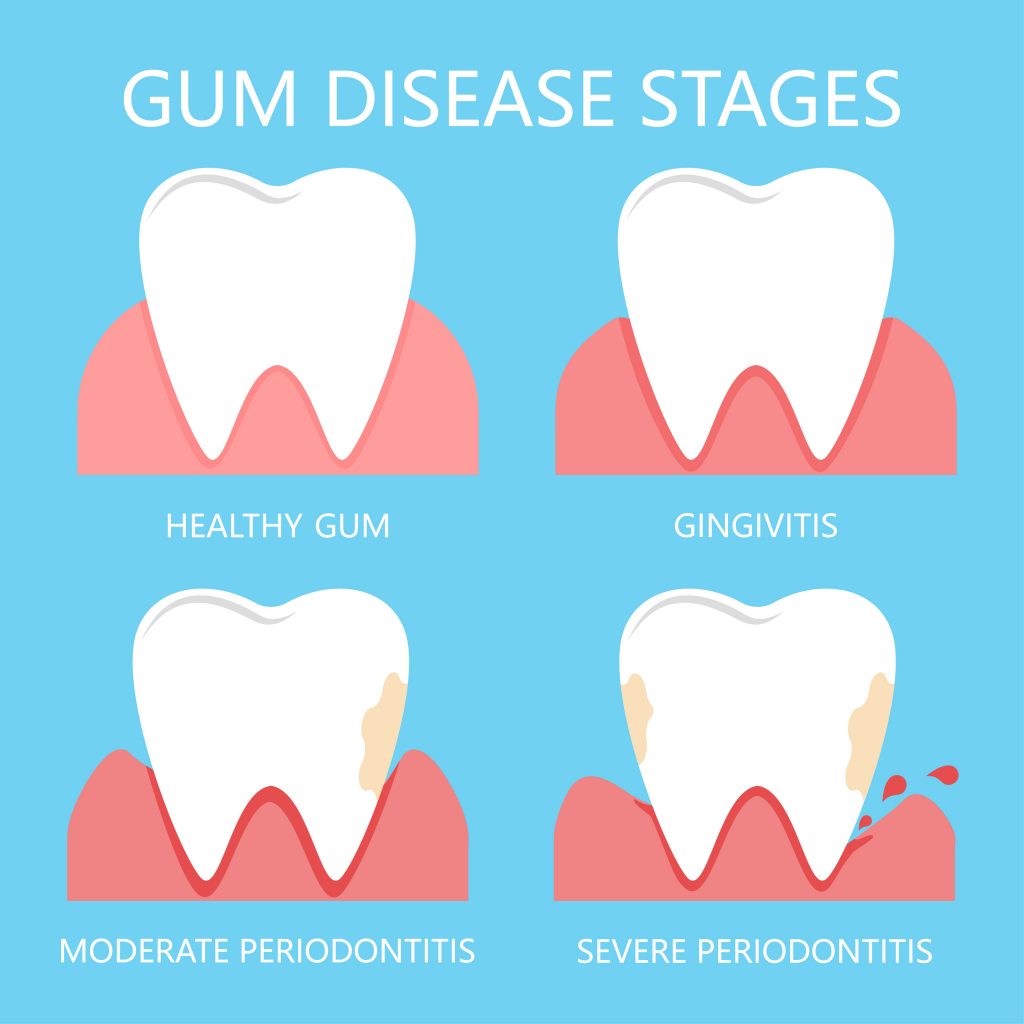Do you have gum disease? Gum disease affects nearly half of all American adults. Therefore, it’s wise for everyone to be familiar with the signs and symptoms of the disease, as well as which treatments are effective. It is usually painless and yet very destructive. It is the most common reason why people lose their teeth!
The common gum diseases that affect about 80% of all adults are gingivitis, an infection of the gums, and periodontitis, an infection of the gums and jawbone.
Gum disease is the result of bacteria living in the crevices between the gum and the tooth that produce destructive enzymes and poisons that cause the gums to bleed and the supporting bone to be dissolved away. When this happens you get loose teeth, bad breath and, as was recently discovered you get more susceptible to heart disease, strokes and diabetes complications too.
Seventy percent of adult tooth loss is attributed to periodontal disease. The earliest sign that you can detect is the appearance of blood on your toothbrush or when you rinse. Normal healthy gums do not bleed. Healthy mouths do not have a foul odor. Regular dental checkups are important because a professional can detect, treat, and reverse periodontal disease in the early stages before significant problems arise.

Gum disease is caused by plaque build-up. In turn, it’s classified by various stages that occur. You should be aware of and contact Dr. Sander I. White if you have the following symptoms:
Any or all of these signs and symptoms can occur and show up in the early stages. They get more noticeable as time goes on. An accurate diagnosis is important to guide the proper treatments
The most common stage of gum disease is called gingivitis in its earliest stage. It can appear at any time of life and is often the result of poor dental hygiene. Health conditions (such as diabetes) or side effects from medicines can also play a role. When left untreated, gingivitis can progress into a more severe form of periodontal disease known as periodontitis as it starts to destroy the supporting jawbone. You’ll start to notice that the symptoms become more frequent and significant. You may bleed more easily, your breath may take on a more unpleasant smell, and you may even notice your teeth start to wobble. Although it may take a long time before these more serious symptoms appear, the damage done is usually irreversible and the health of the mouth is permanently compromised. The aim of treatment at this point is to keep things from getting worse and to avoid losing teeth.
Several factors contribute to the severity of periodontal disease including plaque buildup, genetic disposition, and lifestyle choices. By far, the most common and controllable factor is bacterial plaque, the sticky, colorless film produced by the disease producing oral bacteria. Bacteria release toxins that break down the natural fibers that bond gums to teeth. When this occurs, pockets between the gums and teeth form and more bacteria and toxins hide, flourish, and progressively destroy your gums and jawbone. This process can affect not only gums, teeth, and bone within the mouth, but also your overall systemic health.
Bacteria in your mouth will be inadvertently introduced into your bloodstream because when you have blood coming out through microscopic openings created by the bacteria, staining your toothbrush and saliva, the bacteria in your mouth will find their way into the bloodstream through the same opening. this can compromise your whole-body health. Germs from the mouth have been found all over the body, as they migrate to places like the heart and lungs. These bacteria have been linked to diabetes, heart disease, pancreatic cancer, stroke, obesity, rheumatoid arthritis, and even aortic aneurysms. More oral and body connections are being discovered every day. The takeaway is that healthy gums are essential to a healthy body.
You may also be wondering about the treatment options for gum disease. Periodontal disease can be categorized by the severity of damage to the ligament fibers, which Dr. White will measure. A grading system is implemented to identify the level of danger. Once your periodontal disease has been treated, taking personal responsibility to keep it away is crucial.
The most common treatments are:
Dr. White and his team will recommend the self-care that will help you to maintain and regain your periodontal health. Regular scheduled dental visits will be prescribed which will allow Dr. White to keep a watchful eye on the health of your gums. Generally, you should also brush twice a day, floss once a day, and use recommended mouth rinses at home. Dr. White and his team will recommend the products that will optimize your oral homecare and will also show you the best methods for brushing and flossing. By the way, clean teeth that are bacteria free do not decay either! If you have overcome periodontal disease, our team will recommend frequent checkups to ensure your mouth stays healthy for a lifetime.
Prevention is the best form of protection for your teeth, gums, and general oral health. Employ a good oral hygiene routine at home, for starters. Other steps that can be taken to help prevent periodontal disease include:
Are you looking to get into a better preventive dentistry routine or to know if you have the early stages of gum disease? Contact us today to schedule your appointment or consultation with Dr. White, your partner in the quest for a beautiful, healthy smile.
One thing you should be looking for in a dentist is experience. For over 50 years, patients in Broomall have relied on our professionalism, compassion, and personalized attention. Dr. White is experienced and highly trained with your best interests at heart. He is a member of a number of the top dental professional organizations in the country.